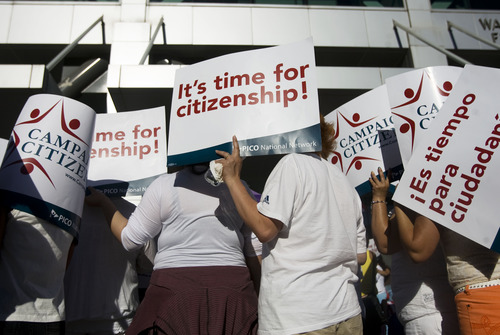This is an archived article that was published on sltrib.com in 2013, and information in the article may be outdated. It is provided only for personal research purposes and may not be reprinted.
Boise, Idaho • Some people in Idaho who entered the United States illegally are benefiting from an obscure visa program designed to help the victims of crimes.
The Idaho Statesman reports one such man, Marcas Zurita, entered the U.S. 18 years ago, crossing the border from Mexico at Tijuana. Though he was in the country without proper documentation, he developed a relationship with a woman and had two children, now 15 and 12 years old.
His former girlfriend reported him, however, resulting in his deportation. In immigration jail he was assaulted.
As a result of his cooperation in that crime, Zurita, now a Nampa resident, was allowed to return to the United States on a so-called "U visa" program. Zurita says that for much of his 18 years in the country, he feared the consequences of courts and police, but that's changed, thanks to the visa program.
"I had to trust in the law," said Zurita, 37.
Visas are available to selected crime victims who cooperate with police and prosecutors. Congress has authorized the Department of Homeland Security to grant up to 10,000 U visas annually for residents who crossed the border illegally or overstayed their visas. After passing a background check and other hurdles, U visa holders may remain up to four years and have the chance to apply for permanent residency after three years.
In the mid-1990s, Zurita crossed into the United States, he says aiming to save enough money to return to Mexico City, build a house and open a neighborhood market. Then he met the woman who would become his girlfriend. They had the two kids and he stayed.
"Plans don't always work out like one thinks they will," he said.
By 2009, the relationship was over and his ex-girlfriend made good on a threat to report his illegal status. Three months into an eight-month stay awaiting deportation at the Canyon County Jail, Zurita was punched in the face by another inmate facing drug charges.
Zurita's jaw was dislocated, teeth chipped and vision blurred. For a month he was on a liquid diet.
He was deported in 2010. But because of his cooperation with authorities in the assault case, Canyon County Prosecutor Bryan Taylor signed the certification in 2011 that allowed him to return to the U.S. In November, Zurita was permitted to re-enter the country.
Taylor, an elected official, has certified 123 U visa applications since 2010.
"These are victims of crimes," he said. "I don't think anybody in this grand world deserves to be abused, battered or harmed in any way. It's a fundamental tenet."
In Boise, Police Chief Mike Masterson has certified 27 of 35 applications for the visas.
Other Idaho law enforcement departments, however, have been reluctant to use the program.
In Meridian, Deputy Chief Tracy Basterrechea said the police department shies from using the program.
"Immigration is the federal government's job," he said. "As a general rule, we just don't sign those. We're reluctant to get involved in this whole thing."
Ada County Sheriff Gary Raney said he's had only three or four requests and hasn't certified any.
"I think it needs to be used judiciously," he said. "In some of our cases, it appears information wasn't accurate."
Wendy Olson, the U.S. attorney in Idaho, said she strongly supports the law as a way to encourage cooperation with law enforcement. Olson has had two requests to certify U visas, both of which she denied because the applicants had been convicted of gun or gang-related offenses.
"They just didn't fit our criteria," she said.
———
Information from: Idaho Statesman, http://www.idahostatesman.com



